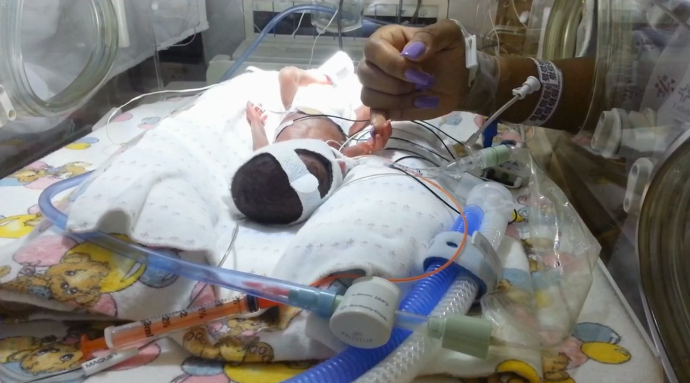By: Alicia Turner
July 14, 2016

TALLAHASSEE, Fla. (WCTV) -- Every year, close to fifteen million babies are born prematurely. It's the most common cause of death for children under age five.
Now a Florida State University professor has invented a device that's a light at the end of the tunnel. He says the light could make all the difference for expectant moms.
Look at family photos of Radiant Jones and you can see she had that pregnancy "glow,” as most pregnant women do, as she prepared to bring her first child into the world.
"You get pregnant and you set out to, 'Ok I’m going to make it to forty weeks and have this baby on time, or a little bit later,' but things happen," Jones says.
For Jones and her husband, things happened quickly. She was admitted to the hospital and placed on bed rest at 24 weeks pregnant.
"Once they saw that she was in distress and it was that time, they went ahead and pulled her," Jones recalls.
Baby Aerione was born just one week later-- almost four months early. She weighed less than one pound at birth and was so small that her dad’s wedding band fit around her tiny arm.
"If we can avoid that, I think we're going to be helping our society," says James Olcese.
Olcese is a medical professor at Florida State University. He's developed an eye mask that he believes can lower-- and possibly eliminate-- the number of premature births.
"There’s been no progress in this field in 30 years. So when I tell them that we can maybe help you with light, they say, ‘Really?’ and I hear a lot of, ‘Interesting!’" Olcese says.
Olcese says his research shows that a high level of melatonin in pregnant mothers induces labor. He says small doses of blue LED light can help break up the melatonin, thus slowing down, or even eliminating, contractions.
The mask would be worn at night-- a time when labor is more likely-- increasing a woman’s chance to make it full term and the baby’s chance for survival.
“We wanted a mask, something that would be comfortable, very affordable and robust," Olcese says.
The new technology could have possibly helped Jones and little Aerione.
"I kind of do want to have another [child], but it’s kind of scary because you don’t want to go through the same thing that you went through the first time. So if they have advances in technology that can kind of help so that these situations don’t happen again, I’m down," Jones says.
It’s technology that could make all the difference for Jones and eventually expectant mothers all around the world.
Olcese says they plan to start another round of clinical trials with the new prototype mask by the end of the year.
As for Aerione, she's now 3 years old. Her parents say you could never guess that she came in the world early. They say she's the average toddler and, like most, she truly keeps them on their toes.
